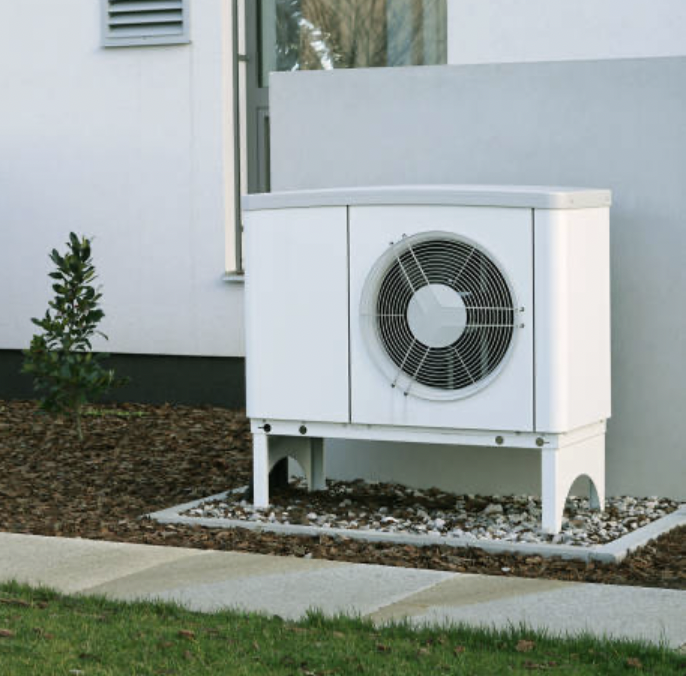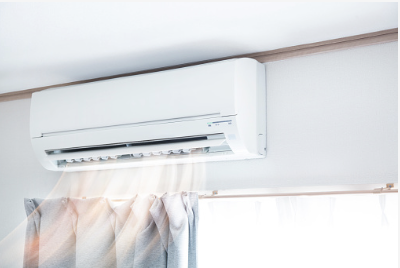A modern heat pump is the smart, clean way to heat, cool, dehumidify and purify the air in your home, and it can be a year-round replacement for your existing HVAC systems. Simply put, a heat pump uses a small amount of electric power to transport heat energy that’s already in the air around you from one location to another. In the winter, it captures abundant heat energy from the outdoors and multiplies it before transferring it to an indoor unit to heat your home. In the summer, the process is reversed, whereby the system operates like an Air Conditioner: The heat pump removes heat from inside your home to cool and dehumidify and transfers the heat energy outside.
It’s often thought that in cold frigid temperatures, heat pumps simply must not provide enough heat to homes. However, air-source heat pumps have been deployed across the country in all climates, including regions that experience cold winters like Maine and Minnesota. Heat energy exists in the outside air all the way down to “absolute zero”, which is -460F. Modern Heat Pumps are designed to utilize this available heat energy to be an effective source of heat, without the necessity for expensive electric heaters or to burn fuels, even when temperatures plummet to as low as -20F.
Modern Heat Pumps can operate in both extreme cold and hot climates because of variable capacity, or Inverter Compressor technology. We call these systems Inverter Heat Pumps. Where traditional HVAC systems are binary in nature, i.e. on or off, variable capacity inverter based systems are adaptive to precisely maintain your preferred comfort condition, efficiently. This technology is especially helpful in winter where the speed of the compressor can be maximized to utilize even more heat energy which translates to higher heating performance and efficiency in the home.


Ducted Air-Source Heat Pumps: Air-source heat pumps (pictured above) transfer heat between your house and the outside air. According to the US Department of Energy, air-source heat pumps reduce your electricity consumption by 50% compared to traditional resistance heating (furnaces and baseboard heaters) and can reach 300-400% efficiency compared to a gas furnace which can only reach 95% efficiency. Air-source heat pumps have been deployed across the country in all climates, including regions that experience cold winters like Maine and Minnesota. Today, high performance air-source heat pumps can still operate over 100% efficiency in subzero temperatures.


Mini-Split Air-Source Heat Pumps: Mini-Split air-source heat pumps (sometimes referred to as “ductless”), are typically inverter compressors or variable speed systems and offer a variety of indoor units in multi-zone or multi-split applications. These systems can provide comfort for single zones of a home to full home solutions creating multiple zones of comfort controlled by the homeowner. Mini-split or non-ducted systems are great applications for homes that do not have ducts or need a better solution to provide comfort to areas of the home that are uncomfortable, new use spaces, or a means to provide comfort to part of the home vs operating a whole home. These systems are generally easier to install than other types of space conditioning units. Installations that use no ducts gain efficiencies as they avoid the energy losses associated with ductwork which can account for up to 30% of energy loss in climate conditioning. Multizone or Multi-Split systems provide the homeowner with options to have multiple zones of comfort with individual zone temperature settings. These system configurations can have up to 8 indoor units or zones operating from one outdoor unit. However, costs of installing mini or multi-split systems can be higher than other systems and correct unit sizing is extremely important.
Geothermal Heat Pumps: Also known as ground-source heat pumps and/or water-source heat pumps, geothermal heat pumps transfer heat between your home and ground or water sources nearby. By taking advantage of nearby consistent ground or water temperatures, geothermal heat pumps can reduce energy use by 30%-60% while having low operating costs. However, upfront installation costs tend to be higher than other types of heat pumps. They can be used in a variety of climates and can be used in extreme climates, however the size of your lot, subsoil, and landscape may hinder installation of these types of heat pumps.
Absorption Heat Pumps: Absorption heat pumps use heat, such as combustion of natural gas, steam solar-heated water, air, or geothermal- heated water, as their energy source rather than electricity. These are typically used in industrial or commercial settings, but have been available for large residential homes.
Why Heat Pumps? They are safer and more efficient, sustainable, and versatile:
Speeds of Heat Pumps:
The type of compressor used in heat pumps is the main difference discussed in this section. Single-stage heat pumps have two modes on or off. When turned on the compressor operates at full power (60 Hz) no matter the weather conditions. Dual-staged heat pumps are units that have three modes and run at either 100% power (60 Hz) or with reduced power or are off. Lastly, variable speed units can operate at more stages and typically with an inverter compressor can exceed 60 Hz well above 100 Hz to quickly meet temperature setpoint and modulate to partial load for extended periods between full power and completely off.
Costs associated with single-stage units is the lowest, but due to only having an on/off option they have shorter run cycles and do not provide great humidity control and more temperature fluctuation above and below setpoint is typical. Dual-staged have higher efficiency and can be run at full power during colder weather and reduced to a lower level of power during more mild days. Variable speed systems is the most expensive unit, but the efficiency ratings, air quality, and humidity control are all better. Instead of having only a few power options, variable speed systems operate by varying the compressor speed, amount of refrigerant flowing, and indoor fan speed based on the home cooling and heating needs providing a more precise temperature and lower cost of operation
Is a Heat Pump Right for You?
Heat pumps deployment is on the rise across the globe. Here in the US, heat pump technology has become more popular and federal and state programs have been developed to assist with the growth in demand. However, while more efficient for both heating and cooling than traditional furnaces and air conditioners, there are a number of factors to consider when determining whether to update your HVAC system to one of these heat pumps.
Location and Climate:
Heat pumps are capable of meeting the entire home heating needs, however single or dual-speed systems will likely rely on electric resistance heating at temperatures below freezing which is the most expensive form of heating and puts the most strain on the electric grid when in this mode of operation. Variable speed systems offer greater opportunity for cold climate heating because the compressor is not limited to the 60 Hz. However, variable speed heat pumps do not mean that all systems are cold climate capable. Make sure you ask for a cold climate heat pump that are made with different compressors which some manufacturers can provide effective heat below-freezing temperatures without electric resistance. Consumers should ask for manufacturers performance of heating (Btu) output at various temperatures when making decisions Depending on your climate you may need to choose different speeds (dual-staged or variable speed) or different types (geothermal or air-source) of units. As a result, if you live in a cooler part of the state that experiences harsher winters it may make more sense to install a variable speed air source unit. While someone living in a warmer climate that experiences less heating days may need a single-stage unit. You may also want to keep your current furnace and consider a retrofit to the furnace that converts to a heat pump providing full cooling and efficient heating with the confidence of a furnace backup or for choosing the most economical fuel heating option.
Costs:
Dependent on the type of your new heat pump unit as well as the size of your home, the upfront costs and operational costs can vary. Average costs of air-source heat pumps can range between $3000 and $5000 per unit with better performing units going higher. Mini-split units can cost between $1300 and $8000 for part home solutions to complex multiple zone systems approaching $25,000. Geothermal heat pumps are more expensive and can range from $10,000 to $30,000 depending on soil conditions, plot size, and other factors. While these numbers may be concerning at first, it is important to consider that replacing a traditional furnace and air conditioner can cost between $1000-$10,000 together. Additionally, there are programs that assist with the upfront costs associated with installing heat pumps. It is helpful to check with your utility provider to see if they are offering rebates or low-cost financing for HVAC replacement. Check the resources section below for links to utility HVAC incentive programs.
Your Home: It is important to perform an energy audit of your home. This inspection of your home provides an analysis of energy flows and provides feedback on the energy efficiency of your house. Energy audits can help prioritize energy efficiency needs to ensure the installation of a heat pump makes the most sense from both energy savings and financial perspectives.
While air source heat pumps can work with most properties, you may not see the same efficiency benefits that you would have otherwise if your home has not been kept up to newer building code standards. In Texas, more than two thirds of homes are over 20 years old and may need additional upgrades like weather stripping, sealing ductwork or attic insulation to see the full benefit of heat pumps.
Government Links
SPEER Members Daikin & Trane Technologies in US DOE Residential Cold Climate Heat Pump Challenge: https://www.energy.gov/eere/buildings/articles/residential-cold-climate-heat-pump-technology-challenge-fact-sheet
US Department of Energy: https://www.energy.gov/energysaver/heat-pump-systems
Texas State Energy Conservation Office: https://comptroller.texas.gov/programs/seco/
Texas Department of Housing and Community Affairs LIHEAP Program: https://www.tdhca.state.tx.us/community-affairs/ceap/index.htm
Energystar: https://www.energystar.gov/productfinder/water-heater-installers-by-state/TX
NYS Clean Heat: Heat Pump Options: https://cleanheat.ny.gov/planner/quiz/?show-all=true
Utility Rebates & Incentives Links
Austin Energy: https://savings.austinenergy.com/rebates/residential/offerings/appliances-and-equipment/hp-water-heater
CPS Energy: https://www.cpsenergy.com/en/my-home/savenow.html?linkvar=SaveNow
Oncor: https://www.oncor.com/takealoadofftexas/pages/home-efficiency
CenterPoint Energy: https://www.centerpointenergy.com/en-us/SaveEnergyandMoney/Pages/home-heating-options.aspx?sa=AR&au=res
AEP Texas: https://www.aeptexas.com/savings/business/energy/heating-cooling
Manufacture Rebates & Incentives Links
Mitsubishi: www.mitsubishicomfort.com/rebates
Daikin: https://daikincomfort.com/buyers-guide/rebates-special-offers
Trane: https://www.trane.com/residential/en/pricing/savings-and-offers/
WaterFurnace: https://www.waterfurnace.com/residential/dealer-locator/
This website uses cookies.